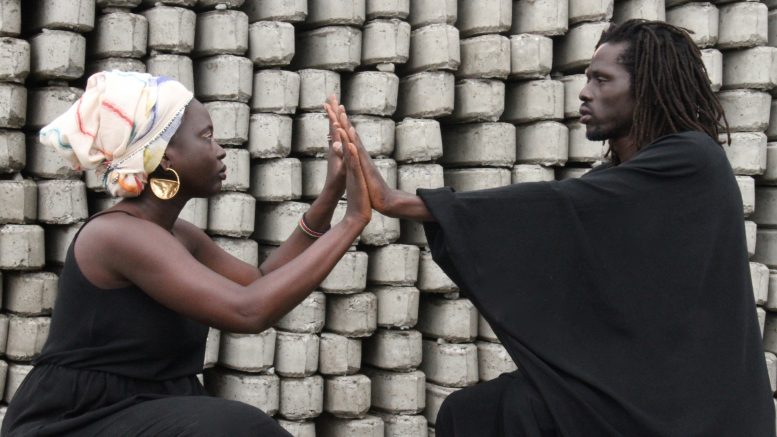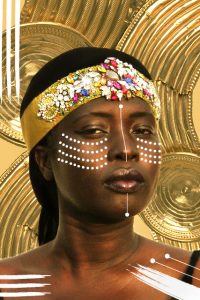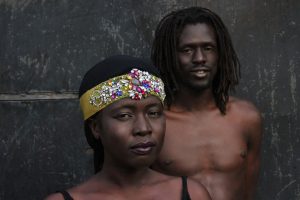Nick Krewen
Special to the Star
March 11, 2019
When it came to recording Naath, the 2019 JUNO Award World Music Album of the Year contender by former Sudanese child soldier Emmanuel Jal and his sister Nyaruach that was crowdfunded by what Jal calls “invisible angels,” there was also a very visible one who donated to the cause.
Peter Gabriel.
“That was a shock,” says dreadlocked rapper Jal, 39, during an interview in the living room of his west end Toronto home.
“Peter Gabriel found out about the link and added his donation. We hoped that people would contribute but, Peter Gabriel is a very different person in the main stage.”
This isn’t the first time singer, songwriter and activist Gabriel has made a big difference in Jal’s life.
The first instance was when he invited Jal to appear on the Cornwall “Africa Calling” stage at Live 8, held on 11 different stages around the world and broadcast over 182 TV and 2000 radio networks back in 2005.
“He’s really, really crucial for my success in the West as an artist,” said Jal. “Because he put me on the Cornwall stage at Live 8 when artists weren’t allowed to be on the main stage in the U.K. There was a big fight because I hadn’t sold millions of records. I told them, ‘Look, I’m the people you’re throwing the party for.” And they told me, “if we put you on stage, China will switch off the TV.’ But Peter Gabriel heard the noise, put me on the stage and just that 15-minute international performance gave me an audience.
“It was a game changer.“
The 14-track, Afrobeat-heavy Naath is also proving to be a game changer for Jal’s sister Nyaruach (pronounced Na-royshe), a mother of two who is currently confined to the Kakuma Refugee Camp, established by the United Nations High Commissioner for Refugees in the Northwest Region of Kenya and home to more than 185,000 South Sudanese evacuees.
One track from Naath, “Gatluak,” a love-‘em-and-leave-‘em heartbreak saga about “a boring man with no plan”that has become a viral sensation for Jal’s singing sister, has transformed her into a celebrity.
“The Nigerians have gone crazy!” Jal chuckles, “They’re posting pictures on the Internet – ‘Look, I found a Gatluak!’ Everybody’s looking for Gatluaks and it’s a form of female activism.”
Repeated attempts by the Star to contact Nyaruach at Kakuma by phone proved fruitless, but Jal – who recorded his sister’s contributions to the album in several Kenya and Nairobi studios with producer Jesse Bukindu – paints a less-than-rosy picture of life at the camp.
“It’s like you’re in a prison,” explains Jal, who wrote and recorded his Naath parts in his Toronto home studio. “You get one meal a day and there’s no proper medication. A lot of issues happen there. She doesn’t have many rights. Anything can happen – your only option is to keep your hope alive. But refugee camp is much safer for her than staying in the city. She was scared that there, she could get kidnapped.”
At the same time, Jal paints a picture of Nyaruach as a “tough activist” and says that part of the catalyst behind the album was to help her establish her own identity as an artist.
“She has a unique voice and she loves music and she has a lot of challenges,” Jal says. “I cannot take care of all of her problems, but I said to her, ‘can we record an album together so the people who know me could know you? You can eventually go onto your own career and earn your own living.’
“The songs she’s done has transformed her life. Sometimes she walks into a restaurant and people don’t want her to pay for the bill. Sometimes she has fans fighting online saying, ‘we’ve got to get you out of the camp.’ They want to rent a place for her, saying, ‘come to Nairobi.”
Separated by the Second Sudanese Civil War, the siblings have taken very different paths in life. Emmanuel Jal was recruited as a child soldier in the Sudan People’s Liberation Army, eventually rescued by a British aid worker. He eventually recorded his first rap album Gua – sung in his native tongue Neur, as well as Dinka, Arabic, English and Swahili.
He performed at Nelson Mandela’s 90thbirthday party and has since settled in Toronto, releasing four more albums and collaborating with such high profile musicians as Alicia Keys, Lauryn Hill, Nelly Furtado, Ed Sheeran, Nile Rodgers and Xavier Rudd. Jal has also branched out into acting, co-starring with Reese Witherspoon in the 2004 motion picture The Good Lie. He published his autobiography, War Child: A Child Soldier’s Story in 2009, has embarked on several peace campaigns and has given several motivational speeches informed by his plight.
According to Nyaruach’s own account on the Global Voices website, she ran away from her abusive father when she was 10, running from Sudan to Ethiopia to eventually Kenya, suffering repression and sexual assault along the way. She reunited with Jal in 2004 and appears on “Gua,” but as documented by Jal earlier, life in camp is a struggle.
Jal, who is awaiting his Canadian citizenship, hopes that the propulsive, infectious rhythms and defiant messages of such sibling co-written Naath songs as “Ti Chuong, ” “Chappe” and “Wale” will elevate Nyaruach’s visibility as an artist – and eventually bring her to Canada.
“The hope is to bring her here and get the right papers,” says Jal. “But since she became an artist internationally, it’s going to make stuff easier for her and speed up the process.”
In the meantime, Jal will continue his mission to “bring the voice out of the refugees in this difficult time.”
“There is no sadness in the album, but that does not mean we cannot communicate. We have a responsibility to be a voice for those people who actually suffer as they’re going through their hardship.“



